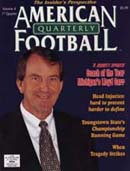AMERICAN FOOTBALL MONTHLY THE #1 RESOURCE FOR FOOTBALL COACHES
Article CategoriesAFM Magazine
|
It Starts at the TopWhile Lloyd Carr credits players and coaches for Michigan's success, he has been the leader.by: John Borton The Wolverine © More from this issue Michigan head coach Lloyd Carr carefully selected the metaphor, just like he did the two previous years. Inspired by the book Into Thin Air, Carr decided his team's journey through its arduous 1997 schedule loomed like an assault on Mt. Everest. Now look who's sitting at the top of the mountain. It's not just his team, the 12-0, Big Ten champion, Rose Bowl champion, national champion Wolverines up there. It's not just the staff, the coordinators and position coaches upon whom the head coach heaps praise. It's Carr-the same Lloyd H. Carr many U of M fans received some 30 months ago with reactions ranging from grudging groans to outright hostility. He's the man who took over the program under dire circumstances and, in his third campaign, won Michigan's first Big Ten championship since 1992 and directed U of M's first....The full article can only be seen by subscribers.
|
|
|||||||
| HOME |
MAGAZINE |
SUBSCRIBE | ONLINE COLUMNISTS | COACHING VIDEOS |
Copyright 2026, AmericanFootballMonthly.com
All Rights Reserved





